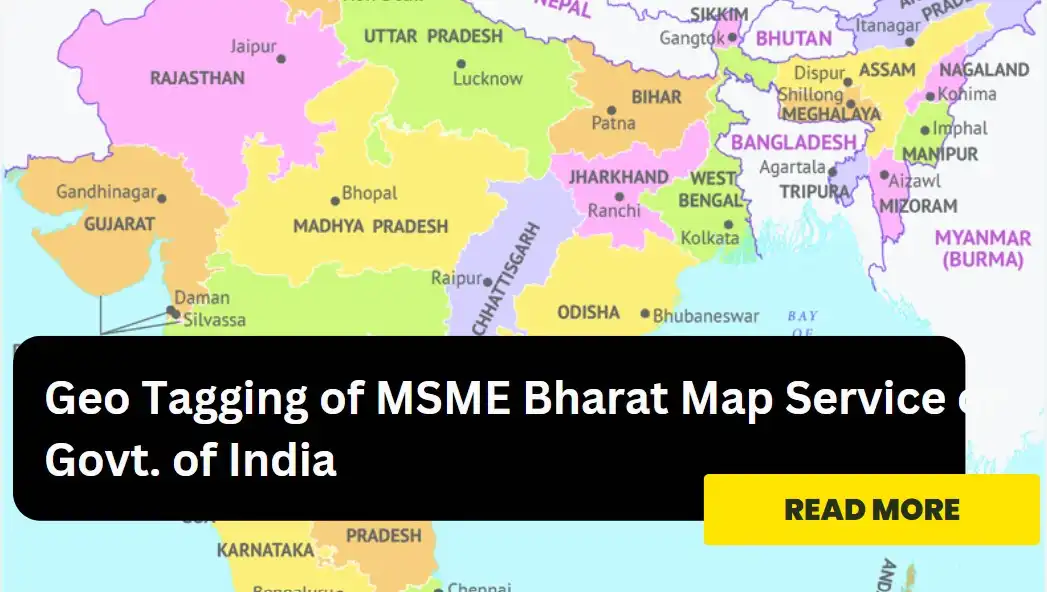Are you facing issues with the geo-tagging functionality of the MSME Bharat Map service provided by the Government of India? Find solutions and get assistance to resolve the problem with the non-functioning geo-tagging feature.
What is Geo-tagging of MSME?
Geo-tagging of MSME (Micro, Small, and Medium Enterprises) on the Udyam Registration Portal refers to the process of adding geographical location information to the registered MSME entities. The Udyam Registration Portal is a government initiative in India that provides a simplified online registration process for MSMEs, allowing them to avail of various benefits and schemes.
The purpose of geo-tagging MSMEs is to create a database or inventory of their locations, which can be useful for various purposes, including:
- Planning and development: Geo-tagging helps government authorities and policymakers identify the distribution and concentration of MSMEs in specific areas. This information can aid in making informed decisions regarding infrastructure development, resource allocation, and regional planning.
- Access to finance: Financial institutions, such as banks and microfinance institutions, can use geo-tagging data to assess the viability and potential of MSMEs in specific regions. This information enables them to make better-informed decisions when providing financial support or loans to these enterprises.
- Marketing and promotion: Geo-tagging allows for targeted marketing and promotion of MSMEs. By knowing their precise locations, local authorities or business associations can create marketing campaigns or directories to promote these enterprises to residents, tourists, or potential customers in the vicinity.
- Monitoring and evaluation: Geo-tagging helps in monitoring the growth and performance of MSMEs over time. By comparing data from different periods, authorities can analyze the changes in the MSME landscape, identify trends, and evaluate the effectiveness of various policies or interventions.
The process of geo-tagging MSMEs typically involves collecting the necessary data, such as the physical address or GPS coordinates, and associating them with unique identifiers for each enterprise. This information is then mapped or stored in a database, which can be accessed and utilized by relevant stakeholders.
It’s worth noting that the specific implementation and usage of geo-tagging may vary depending on the country or region. Local regulations, privacy considerations, and technological infrastructure can influence the approach taken for geo-tagging MSMEs.
Geo-tagging of MSMEs
Once the geo-tagging of MSMEs is complete, the gathered data can be utilized in various ways:
- Geographical analysis: The collected geo-tagging data can be analyzed to identify clusters or concentrations of MSMEs in specific areas. This information can help identify industrial zones or areas with a high density of enterprises, allowing for targeted interventions and support.
- Disaster management: During natural disasters or emergencies, geo-tagging enables authorities to quickly identify and locate MSMEs in affected areas. This information aids in assessing the impact of the disaster, coordinating relief efforts, and providing targeted assistance to the affected enterprises.
- Supply chain optimization: By understanding the geographic distribution of MSMEs, businesses and supply chain managers can optimize logistics and transportation. They can identify nearby suppliers, potential collaboration opportunities, and reduce transportation costs by locating suppliers closer to their operations.
- Market research and competitiveness analysis: Geo-tagging data provides insights into the local business environment, competition, and market potential. Researchers and analysts can utilize this information to conduct market research, identify gaps or opportunities, and assess the competitiveness of different regions or industries.
- Policy formulation and implementation: Governments can leverage geo-tagging data to formulate and implement targeted policies and initiatives for the development and growth of MSMEs. By understanding the geographical distribution of these enterprises, policymakers can design region-specific interventions to address specific challenges or capitalize on local strengths.
Overall, geo-tagging of MSMEs serves as a valuable tool for data-driven decision-making, resource allocation, and fostering the growth of these enterprises. It enables stakeholders to have a comprehensive understanding of the MSME landscape, facilitates efficient planning, and supports the development of vibrant and sustainable entrepreneurial ecosystems.
Error in Geo Tagging of MSME
Facing issues with the geo-tagging of MSMEs using the Bharat Map service of the Government of India.
On MSME Udyam registration portal adding longitude and latitude Geo tagging of MSME getting technical error.
You will get real-time information or access to current technical details or service statuses.
Need help in udyam registration help do consult us for the service.
If you’re experiencing difficulties with the Bharat Map service, we recommend reaching out to the appropriate authorities or support udyam msme helpline to report the issue.
You can try contacting the technical support team or helpline provided by the Government of India for the Bharat Map service. They should be able to provide you with assistance, guidance, or updates regarding the service.
Alternatively, you can explore online forums, community boards, or social media platforms to see if other users have encountered similar issues and if there are any known solutions or workarounds.
Remember that technical issues with online services can occur for various reasons, including maintenance, updates, or server problems.
It’s best to reach out to the relevant support channels to receive accurate and up-to-date information regarding the status of the service and assistance with any problems you’re facing.
Geo Tagging MSME Bharat Map Service
Streamlining Location Data for Indian Businesses
The digital landscape has opened up immense possibilities for businesses worldwide. In India, the micro, small, and medium enterprises (MSMEs) sector plays a crucial role in the country’s economic growth. To further empower and support these enterprises, the government has introduced the geo tagging MSME Bharat Map Service. This groundbreaking service aims to streamline location data and enhance the visibility and accessibility of MSMEs across the nation. In this article, we delve into the intricacies of this service, its implementation process, and its potential benefits for Indian businesses.
Geo Tagging MSME Bharat Map Service: Enhancing Visibility and Accessibility
Location data holds immense value for businesses, enabling them to reach their target audience effectively. The geo tagging MSME Bharat Map Service leverages this potential by providing a comprehensive platform for MSMEs to manage and showcase their locations. Let’s explore how this service is revolutionizing the way businesses operate:
1. Improved Online Presence and Discoverability
With the geo tagging MSME Bharat Map Service, businesses can boost their online presence significantly. By accurately tagging their locations, MSMEs become more visible to potential customers searching for relevant products or services in their area. This increased discoverability can lead to higher footfall, website traffic, and ultimately, improved sales.
2. Efficient Resource Allocation
Managing location data effectively is essential for MSMEs, especially when it comes to resource allocation. With the geo tagging MSME Bharat Map Service, businesses gain valuable insights into their customer demographics and geographic distribution. This information aids in making informed decisions about inventory management, marketing campaigns, and expansion plans.
3. Seamless Navigation and Directions
By integrating with popular navigation applications, the geo tagging MSME Bharat Map Service facilitates seamless navigation for customers. When users search for a specific product or service, they can easily locate nearby MSMEs and receive precise directions to their desired destination. This feature not only improves the customer experience but also increases the chances of conversion for businesses.
Implementing the Geo Tagging MSME Bharat Map Service
Implementing the geo tagging MSME Bharat Map Service involves a few straightforward steps. Let’s explore the process in detail:
1. Registration and Verification
To get started, MSMEs need to register themselves on the official platform designated for the geo tagging MSME Bharat Map Service. During the registration process, businesses provide essential information, such as their company details, contact information, and location coordinates. Verification is an integral part of the process to ensure data accuracy and maintain the credibility of the platform.
2. Location Tagging
Once registered, businesses can proceed with location tagging. The geo tagging MSME Bharat Map Service provides a user-friendly interface where MSMEs can input their location details accurately. This step involves specifying the coordinates, adding relevant business information, and selecting appropriate categories and tags to enhance discoverability.
3. Integration and Testing
After location tagging, businesses can integrate the geo tagging MSME Bharat Map Service with their existing digital platforms, such as websites and mobile applications. Integration ensures a seamless user experience and allows customers to access the MSME’s location data effortlessly. Before going live, thorough testing should be conducted to verify the accuracy of location data and navigation functionalities.
4. Regular Updates and Maintenance
To maximize the benefits of the geo tagging MSME Bharat Map Service, it is crucial for businesses to keep their location data up to date. Regular updates should be performed whenever there are changes in business hours, contact information, or location coordinates. This practice ensures that customers receive accurate information and minimizes any potential inconvenience.
FAQs About Geo Tagging MSME Bharat Map Service
Here are some frequently asked questions about the geo tagging MSME Bharat Map Service, along with their answers:
Is the geo tagging MSME Bharat Map Service free for businesses?
Yes, the geo tagging MSME Bharat Map Service is currently provided free of cost to MSMEs in India.
Can MSMEs update their location information whenever needed?
Absolutely. MSMEs have the flexibility to update their location data whenever there are changes or new developments.
Are there any size restrictions for MSMEs to avail of this service?
No, the geo tagging MSME Bharat Map Service is open to all micro, small, and medium enterprises across various industries.
Can businesses integrate the geo tagging service with their own websites?
Yes, the geo tagging MSME Bharat Map Service allows seamless integration with existing websites and digital platforms.
What are the potential benefits for businesses that use this service?
The geo tagging MSME Bharat Map Service offers improved discoverability, efficient resource allocation, and seamless navigation to businesses.
Does the service provide analytics or insights into customer behavior?
While the service primarily focuses on location data, future updates may include analytics and insights for businesses.
Geo Tagging of MSME Bharat Map Service of Govt. of India not Working what should i do?
If you are facing issues while udyam registration in Geo tagging you should refresh it and try again. If you are still facing the issues do consult the udyam registration team who will help you get you udyam certificate.
Conclusion
The geo tagging MSME Bharat Map Service is an innovative solution that empowers Indian MSMEs by streamlining their location data. By leveraging this service, businesses can enhance their online presence, improve resource allocation, and provide seamless navigation to their customers. With its user-friendly implementation process and potential benefits, this service paves the way for the growth and success of MSMEs across India. Embrace the geo tagging MSME Bharat Map Service today and unlock the full potential of your business.
Follow us on Google News




